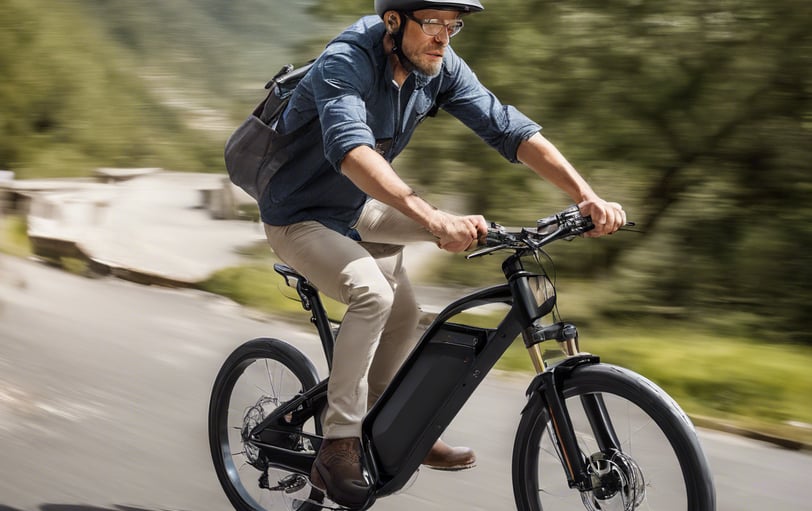Turn Every Ride Into an Adventure, Your Electric Freedom Awaits! 🚴♂️⚡ SHOP NOW! 🌍🚀
The Environmental Benefits of Switching to Electric E-Bikes and Their Impact on the Community
Daniel Walters
3/7/20237 min read


Introduction to Electric E-Bikes
Electric e-bikes, commonly referred to as e-bikes, are bicycles that are equipped with an integrated electric motor. This motor assists the rider's pedal power, making it easier to navigate various terrains and reducing the physical exertion required to travel long distances. E-bikes are powered by rechargeable batteries, which can typically last for significant ranges before needing a recharge. This unique blend of traditional cycling and modern technology has made e-bikes an increasingly popular mode of transportation in urban and suburban areas.
The surge in popularity of electric e-bikes can be attributed to several factors. One of the most significant is their potential as a green transportation alternative. Unlike gasoline-powered vehicles, e-bikes produce no direct emissions, making them a cleaner option for individuals seeking to reduce their carbon footprint. Additionally, their energy-efficient operations add to their appeal, offering a practical solution to alleviate urban congestion and reduce pollution.
Beyond the obvious environmental benefits, e-bikes provide notable advantages to communities. They offer an affordable and accessible means of transport, bridging gaps in public transportation networks. By reducing reliance on cars, e-bikes help lower traffic density, contributing to quieter, safer, and more livable neighborhoods. Furthermore, they promote a healthier lifestyle by encouraging physical activity, even though assisted by the electric motor.
The benefits e-bikes offer to both individuals and society are increasingly recognized, driving their acceptance as a feasible and sustainable transit option. As cities and communities strive to implement eco-friendly policies and infrastructure, the role of e-bikes emerges as a pivotal aspect of this transformation. They represent a step forward in our collective efforts to foster environmental stewardship while enhancing the quality of urban life.
Reduction in Carbon Emissions
In the quest to mitigate climate change, the switch to electric e-bikes has emerged as a vital tool in reducing carbon emissions. Traditional gas-powered vehicles are major contributors to greenhouse gas emissions, which exacerbate global warming. Conversely, electric e-bikes present an environmentally friendly alternative, with studies indicating a substantial decline in CO2 emissions when individuals opt for these two-wheelers over conventional cars and motorcycles.
Statistics underscore the positive impact of this transition. For instance, a report from the European Cyclists' Federation reveals that e-bikes produce approximately 22 grams of CO2 per kilometer, compared to over 271 grams for a car. This significant disparity underscores the potential of e-bikes in creating greener cities and reducing our carbon footprint.
The role of e-bikes in combating climate change extends beyond mere statistics. E-bikes offer a sustainable transportation option that lessens reliance on fossil fuels, contributing to cleaner air and reduced levels of harmful pollutants. Cities that have embraced widespread e-bike adoption have noted not just declines in emissions but also improvements in air quality and general public health.
Real-world examples exemplify these benefits. In Copenhagen, Denmark, a city renowned for its bicycle infrastructure, the integration of e-bikes into the transportation system has significantly cut down on carbon emissions. Similarly, Portland, Oregon, has leveraged e-bike programs to complement its robust public transit system, resulting in lower traffic congestion and a marked reduction in greenhouse gases.
As more cities acknowledge the environmental benefits of electric e-bikes, such initiatives are likely to gain momentum worldwide. This shift towards greener transportation modes is an essential step in the global fight against climate change, highlighting the profound impact e-bikes can have on reducing carbon footprints and fostering sustainable urban environments.
Lower Noise Pollution
Electric e-bikes represent a significant breakthrough in combating noise pollution in urban environments. Conventional motor vehicles, including motorcycles and cars, contribute markedly to the cacophony of city soundscapes. This pervasive noise pollution has been linked to a variety of adverse health effects, including elevated stress levels, sleep disturbances, and cardiovascular problems. The reduction of such environmental impacts is paramount for fostering healthier, more livable cities.
The operation of electric e-bikes is notably quieter compared to their gasoline-powered counterparts. The absence of internal combustion engines in e-bikes eliminates the primary source of mechanical noise, thus offering a substantially quieter alternative for urban transportation. The quieter nature of electric e-bikes not only benefits riders by providing a more peaceful commuting experience but also extends these benefits to pedestrians and residents in densely populated areas.
With the introduction of electric e-bikes, urban soundscapes can remarkably transform. Reduced noise levels contribute to a more tranquil environment, which is crucial for improving mental well-being in the community. Studies have shown that quieter environments are associated with lower levels of stress and anxiety among urban dwellers. Furthermore, the noise reduction associated with electric e-bikes can mitigate noise-related sleep disturbances, promoting better public health outcomes.
Moreover, the shift to quieter electric e-bikes has the potential to enhance urban living conditions. Retailers, restaurants, and local businesses situated in bustling areas often suffer from the incessant drone of traffic noise, which can detract from customer experiences. Electrification of personal and shared mobility options provides a compelling opportunity to revitalize these spaces, creating more attractive and comfortable urban settings that encourage social interaction and economic activity.
Overall, the switch to electric e-bikes contributes substantially to reducing noise pollution, thereby fostering healthier, quieter, and more vibrant urban communities. This pivotal change aligns with broader environmental goals, emphasizing the importance of sustainable, community-focused transportation solutions.
Decreased Traffic Congestion
Electric e-bikes represent a transformative shift in urban transportation, significantly contributing to the reduction of traffic congestion in cities. Traditional motor vehicles often dominate urban roads, leading to gridlocks that exacerbate both stress and pollution. In contrast, electric e-bikes offer a nimble and efficient alternative. Their compact size and agility enable riders to navigate through dense traffic with ease, bypassing the bottlenecks that hinder larger vehicles.
The efficiency of e-bikes in mitigating traffic is particularly evident during peak commute hours. Unlike cars, which can occupy substantial road space and create traffic jams, e-bikes require minimal space. This capacity to maneuver through tight spots considerably reduces the time spent in transit. As a result, e-bike commuters can enjoy shortened travel times, making their daily journeys more predictable and less stressful.
Moreover, the widespread adoption of electric e-bikes has the potential to reshape urban landscapes by diminishing the need for extensive car-centric infrastructure. With fewer cars on the roads, the demand for expansive parking facilities and multi-lane roads decreases. This evolution leads to more spacious and user-friendly urban environments. Cities can reallocate these reclaimed spaces, transforming them into green areas, pedestrian paths, and dedicated bike lanes, thereby enhancing the overall quality of urban life.
Additionally, the environmental impact of reduced traffic congestion should not be underestimated. Less idling and fewer stop-and-go scenarios result in lower emissions, contributing to improved air quality. As more individuals opt for electric e-bikes, the cumulative reduction of traffic can play a crucial role in addressing urban air pollution challenges.
By seamlessly integrating electric e-bikes into urban transit systems, cities can move towards a more efficient, sustainable, and livable future. The role of electric e-bikes in alleviating congestion not only facilitates smoother commutes but also encourages the development of healthier, more vibrant urban communities.
Promotion of Healthy Lifestyles
Electric e-bikes offer a unique blend of physical activity and convenience, making them an appealing option for a wide range of individuals and promoting healthier lifestyles within communities. Unlike traditional bicycles, electric e-bikes provide pedal-assist technology. This feature allows riders to engage in physical exercise without becoming overly fatigued, making it accessible for people of varying fitness levels and ages. As a result, electric e-bikes serve as a feasible alternative to sedentary forms of transportation, such as cars, and encourage more community members to incorporate physical activity into their daily routines.
The health benefits of biking are well-documented. Regular cycling can improve cardiovascular fitness, muscle strength, and joint mobility, while also contributing to weight loss and better mental health. By providing a less strenuous option, electric e-bikes lower the barrier to entry for those who might be intimidated by the exertion required for traditional biking. This inclusivity ensures that more people can enjoy the health advantages associated with cycling.
Active transportation, such as biking, also fosters a more connected and active community. Neighborhoods with higher rates of cycling often experience increased interaction among residents. This sense of community is further strengthened by organized group rides and local cycling events, which can be facilitated by the widespread use of electric e-bikes. Additionally, reducing reliance on motor vehicles cuts down on traffic congestion and air pollution, creating a more pleasant and healthier living environment for everyone.
Thus, electric e-bikes not only contribute to individual health by promoting physical activity, but they also play a significant role in building vibrant, engaged, and healthier communities. As more people embrace this eco-friendly mode of transportation, the collective benefits to public health and community well-being will continue to expand.
Economic Benefits to Local Communities
The transition to electric e-bikes presents significant economic benefits for local communities. One of the most evident advantages is the reduction in transportation costs for individuals. Electric e-bikes offer a cheaper alternative to traditional vehicles, which require costly fuel and maintenance. By opting for e-bikes, community members can substantially lower their monthly expenses, effectively increasing their disposable income and enabling them to divert funds towards other local goods and services, thereby stimulating the local economy.
Moreover, the widespread adoption of electric e-bikes can lead to increased local commerce. As transportation becomes more accessible and efficient, individuals are more likely to travel locally more frequently. This facilitates greater patronage of neighborhood businesses, such as cafes, restaurants, and retail stores. In turn, this local spending boost supports commercial activity and promotes urban economic health. By fostering a vibrant local economy, e-bike use does not only benefit individual riders but the wider community as well.
Another important economic benefit is the creation of job opportunities within the e-bike sector. The growing demand for electric e-bikes can spur job growth in several areas, including manufacturing, maintenance, and rental services. Local bike shops may see an uptick in business as they diversify their offerings to include e-bike products and services. Consequently, the need for skilled technicians capable of performing e-bike maintenance and repairs is likely to rise. Additionally, e-bike rental companies may emerge or expand, catering to both residents and tourists, further contributing to job creation.
In sum, the transition to electric e-bikes holds the potential to invigorate local economies by reducing transportation costs, encouraging local commerce, and providing new employment opportunities. As communities embrace these benefits, the broader societal impacts of e-bikes will become increasingly evident, marking a significant step towards sustainable and thriving local economies.
Address:
999 Charlotte Hwy, NC 28730, USA
Sales:
Email: sales@ecobikemachines.com
Call: (863) 272-9235
Subscribe to our newsletter
COMPANY
Online Support:
Email: support@ecobikemachines.com
Call: (626) 686-4545
